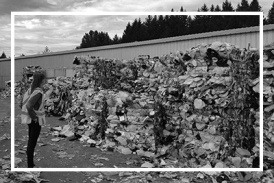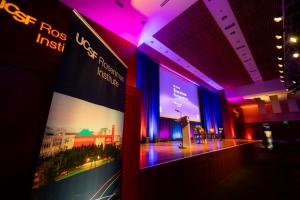Rosenman Symposium 2025 Brings National Healthcare Innovation to UCSF
A signature UCSF event, the symposium convenes top minds to address cost, equity, and the future of care
Held under the theme “Healthcare in Harmony: Balancing Innovation, Cost & Care,” the symposium brought together clinicians, founders, policymakers, investors, and payers for an invite-only event structured around roundtables, fireside chats, and unrecorded sessions designed to go beyond the surface.
As a proud innovation hub at UCSF, one of the world’s leading health sciences institutions, the Rosenman Institute exists to convene, connect, and catalyze—bringing national voices together to inspire breakthrough solutions and foster lasting partnerships.
UCSF faculty, staff, and students played central roles as speakers, moderators, session introducers, and thought leaders, helping shape the dialogue on cost, equity, and innovation.
“We’re grateful to be part of UCSF, a place where innovation, research, and care come together every day,” said Christine Winoto, Executive Director of the UCSF Rosenman Institute. “This symposium reflects that spirit, connecting UCSF with leaders from across the healthcare ecosystem so we can shape what’s next together.”
Discussions spanned a wide range of intersecting issues, including the $9 trillion forecast for U.S. healthcare spending, equity gaps, cardiac rehab, and behavioral health. Throughout, participants explored how to design healthcare that is not only innovative and cost-effective, but also inclusive, measurable, and accountable.
The Rosenman Institute’s role as a connector and catalyst within UCSF was evident across the event, building bridges and drawing national partners in. Every voice in the room, from early-stage entrepreneurs to UCSF Health executives, contributed to a shared mission: building a healthcare system that works for everyone.
The symposium also honored Dr. Sandra Hernández, President and CEO of the California Health Care Foundation, with the 2025 UCSF Healthcare Impact Award, recognizing her decades-long leadership in advancing equity, public accountability, and access across the state.
Participant Impact
The impact of the event was echoed in participant feedback, with many describing the symposium as “the premier event,” “an enriching experience,” and “a space for candid discussions and real solutions.” Attendees praised the quality of the speakers, the networking opportunities, and the diversity of perspectives represented across panels. For many, it was a rare opportunity to connect with healthcare stakeholders—from payers and providers to investors and researchers.
As always, the Rosenman Symposium followed Chatham House Rules and was not recorded, creating a rare space for honesty and breakthrough thinking.
“This event isn’t just a platform—it’s a meeting point,” said Winoto. “And being part of UCSF makes it possible to connect UCSF with the innovators driving healthcare forward.”
Participant Testimonials:
“The Rosenman Symposium is the premier event for those in healthcare innovation who want to hear from all the stakeholders involved in delivering care.” — Randy Preston
“An incredibly enriching experience. The content was timely and thought-provoking… I left feeling inspired and ready to push the conversation forward.” — Maria Molland
“Each presentation was deeply empowering. I left the event better informed and more motivated to advocate for change.” — Karin Bartley
“This is a symposium of ideas and innovation… the perfect place to be inspired, wowed, and reminded that we have work to do—but also a path forward.” — Fumi Mitsuishi
About the UCSF Rosenman Institute
The UCSF Rosenman Institute is a healthcare innovation hub at the University of California, San Francisco. We convene the brightest minds in healthcare, connect them across disciplines, and catalyze solutions that transform care. We accelerate the development of groundbreaking health technologies by providing entrepreneurs with access to mentorship, funding, and business development opportunities. Through programs such as ADAPT, RISE, and Rosenman Innovators, the Institute is committed to advancing healthcare equity, improving patient outcomes, and transforming care on a national scale.
Herminio Neto
UCSF Rosenman Institute
hello@rosenmaninstitute.org
Visit us on social media:
LinkedIn
Legal Disclaimer:
EIN Presswire provides this news content "as is" without warranty of any kind. We do not accept any responsibility or liability for the accuracy, content, images, videos, licenses, completeness, legality, or reliability of the information contained in this article. If you have any complaints or copyright issues related to this article, kindly contact the author above.
Protection Tax Helps Clients Resolve Unfiled Returns Before IRS Action Escalates
leagend T31 Sets New Standard for Affordable and Accurate OBD II Diagnostics
Couple Opens Unique '432Hz' Live Music Sanctuary on Spain's Costa del Sol for Summer Vibes and Son Awareness
Kalendarium
Więcej ważnych informacji
 Jedynka Newserii
Jedynka Newserii

 Jedynka Newserii
Jedynka Newserii

Handel

Ze względu na różnice w cenach surowce wtórne przegrywają z pierwotnymi. To powoduje problemy branży recyklingowej
Rozporządzenie PPWR stawia ambitne cele w zakresie wykorzystania recyklatów w poszczególnych rodzajach opakowań. To będzie oznaczało wzrost popytu na materiały wtórne pochodzące z recyklingu. Obecnie problemy branży recyklingu mogą spowodować, że popyt będzie zaspokajany głównie przez import. Dziś do dobrowolnego wykorzystania recyklatów nie zachęcają przede wszystkim ceny – surowiec pierwotny można kupić taniej niż ten z recyklingu.
Przemysł spożywczy
Rośnie presja konkurencyjna na unijne rolnictwo. Bez rekompensat sytuacja rolników może się pogarszać

Rolnictwo i żywność, w tym rybołówstwo, są sektorami strategicznymi dla UE. System rolno-spożywczy, oparty na jednolitym rynku europejskim, wytwarza ponad 900 mld euro wartości dodanej. Jego konkurencyjność stoi jednak przed wieloma wyzwaniami – to przede wszystkim eksport z Ukrainy i niedługo także z krajów Mercosur, a także presja związana z oczekiwaniami konsumentów i Zielonym Ładem. Bez rekompensat rolnikom może być trudno tym wyzwaniom sprostać.
Transport
Infrastruktury ładowania elektryków przybywa w szybkim tempie. Inwestorzy jednak napotykają szereg barier

Liczba punktów ładowania samochodów elektrycznych wynosi dziś ok. 10 tys., a tempo wzrostu wynosi ok. 50 proc. r/r. Dynamika ta przez wiele miesięcy była wyższa niż wyniki samego rynku samochodów elektrycznych, na które w poprzednim roku wpływało zawieszenie rządowych dopłat do zakupu elektryka. Pierwszy kwartał br. zamknął się 22-proc. wzrostem liczby rejestracji w ujęciu rocznym, ale kwiecień przyniósł już wyraźne odbicie – o 100 proc.
Partner serwisu
Szkolenia

Akademia Newserii
Akademia Newserii to projekt, w ramach którego najlepsi polscy dziennikarze biznesowi, giełdowi oraz lifestylowi, a także szkoleniowcy z wieloletnim doświadczeniem dzielą się swoją wiedzą nt. pracy z mediami.









.gif)

 |
| |
| |
|